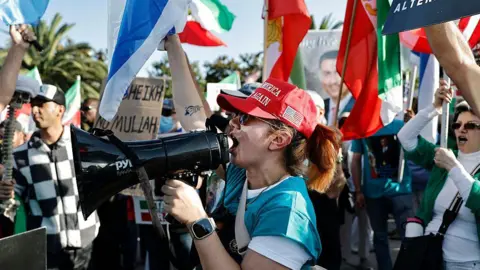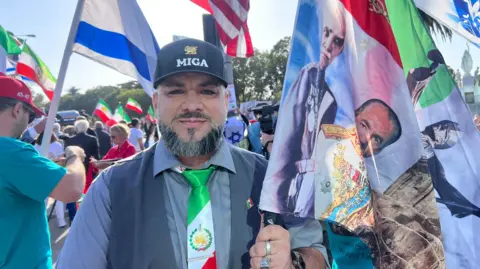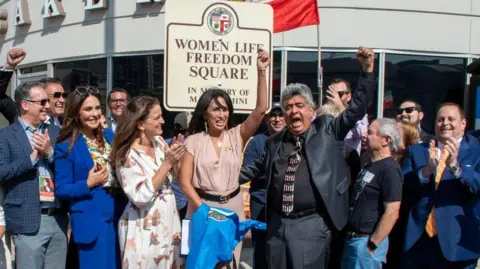Make Iran Great Again? 'Tehrangeles' community in LA reflects on US strikes
 Getty Images
Getty ImagesA woman in a "Make America Great Again" hat leads a chant for "regime change" in Iran.
The crowds dance and wave Iranian, Israeli and American flags as Persian music blasts. Car horns beep in support but also some annoyance in LA's gridlocked traffic.
Protests outside the West LA Federal Building are a common site, but even by LA standards this one is unusual, happening under the watchful eyes of armed US Marines, controversially ordered there by President Trump during protests against immigration raids.
But these immigrants are proudly demonstrating in MAGA hats in support of President Trump and his decision to intervene in the Israel-Iran conflict by launching air strikes against Iranian nuclear sites.
"We want regime change in Iran," says Bita Ashrafi, who left Iran 50 years ago and attended the protest wearing a "Trump Was Right About Everything" hat.
"I fully support President Trump's decisions because this has been going on for 46 plus years - the tyranny, the dictatorship."
West LA, often called Tehrangeles, is home to the largest population of Iranians outside of Iran, formerly known as Persia. There are Persian restaurants and bookstores and shops selling the saffron and rose ice cream popular in Iran.
Many of Southern California's Iranian Americans are in full support of President Trump and Israeli Prime Minister Netanyahu.
But others say the involvement of the US, called the "Great Satan" by hardliner religious leaders in Iran, will only bolster Iran's leaders.
Ms Ashrafi took to the streets with several hundred others to show her support for Trump and regime change in Iran a day after a "No War" protest broke out in the same spot in response to the US "bunker busting" bombing of nuclear sites in Iran.
The US president said the action was necessary because Iran was close to developing a nuclear bomb. Tehran has always said its nuclear programme is for peaceful purposes.
- Trump takes victory lap but big questions remain
- What leaked intel report tells us about damage to Iran sites
Persian Americans are worried about friends and family in their homeland who they've struggled to reach with Iran's phones and internet shut off. They also have strong feelings about how their adopted country should respond to Iran.
"Do not negotiate with them. They will go back to terrorising the world," said Farzan Seyed, who was dressed in a MIGA (Make Iran Great Again) hat - the acronym popularised by Trump on social media - and a tie showing the lion and sun emblem from Iran's pre-1979 flag. He says Trump should show support for regime change but not get too involved.

"The people have to choose," he says, though he hopes they choose exiled Crown Prince Reza Pahlavi who also lives in the United States.
Iranian-American families in Southern California lost so much when they fled Iran, he says, adding that when they get together – whether Jewish, Christian, Muslim, Baháʼí or Zoroastrian – they "speak with one voice from West LA" against the Islamic Republic.
Many Iranian Americans dispute that there is one voice. The cafes and restaurants in West LA are full of debates about what should and could happen next in Iran. And not everyone in the community wears MAGA hats and supports the US bombing.
- 'We're exhausted' - how Iranians feel after fragile ceasefire
- 'We thought it was the end' - Israeli town reels
Roozbeh Farahanipour – once imprisoned in Iran for his activism - says he fears the US involvement will push Iran into a broken, uncertain future.
"The job needs to be done by Iranian people," he says in one of the three restaurants he now owns in the heart of Tehrangeles. "If we look at the history, I don't think that's the result of the Iraq, Afghanistan, Libya, even Syria."
While he voted for Trump, Mr Farahanipour says he's disappointed in the president. He said he supports targeted sanctions, not missiles, and that he doesn't want his taxpayer money going to fund attacks against Iran.
He knows that's not a popular opinion in this community and it's caused a rift with one of his oldest and closest friends, Elham Yaghoubian.
While the majority of this region's Persian community fled to LA in 1979 after the Islamic Revolution, Mr Farahanipour and Ms Yaghoubian came later in 2000 after they were both targeted as enemies of the state for creating an underground opposition movement.
Mr Farahanipour was arrested along with his mother and several friends for his activism during a meeting at his home. Ms Yaghoubian escaped arrest – she was meant to be at Mr Farahanipour's house that night but decided not to go.
 Courtesy Roozbeh Farahanipour
Courtesy Roozbeh FarahanipourFor decades, they have worked together as activists in Iran and in LA, where they both became successful entrepreneurs. Together they were instrumental in getting a corner of LA named "Persian Square."
Later, they successfully lobbied the city to rename part of Westwood Boulevard "Women Life Freedom Square" in honour of Masha Amini, who was killed by Iran's morality police in 2022 for not wearing her hijab head covering the way they wanted.
"We were shoulder-to-shoulder, until now," says Mr Farahanipour.
Ms Yaghoubian says her position is nuanced.
"I've never been a supporter of military action against Iran," she says. "Now that it has happened and many of the regime's tools of suppression have been weakened it may present an opportunity for people in Iran to push for change."
She says she hopes the Israeli and the US attacks on Iran will help Iranians rise up and overthrow the regime.
The majority of people in Iran are "living in poverty," she says. Her friends there tell her they have nothing to lose.
"This is the only opportunity for the Iranian people to rise and make a change," she says.
Like others in Southern California's Persian community they both fret over loved ones back in Iran, even if they don't see eye to eye on how the US should respond to Iran.
When President Trump warned "everyone to evacuate" Tehran earlier this month, the world saw footage of thousands of terrified Iranians stuck in traffic trying to escape an escalation in the war.
Writer and actor Mary Apick, who was a child star in Iran and now lives in Los Angeles, says she is heartened watching how many Iranians she saw helping each other amid the traffic, sharing water and gasoline and offering strangers rides.
"There's a camaraderie which is unbelievable," she says, adding that she has family she is worried about in Iran. "This regime has to go. People are sick and tired."
